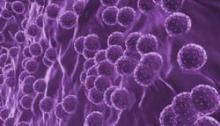A triple antiviral combination with direct-acting antiviral (DAA) agents was associated with high rates of sustained virologic response (SVR) across all three hepatitis C virus (HCV) genotypes evaluated, according to combined data from two phase II studies described in an abstract to be presented in a late-breaker session at the annual meeting of the American Association for the Study of Liver Disease.
The robust SVR rates “support further evaluation of this three-drug combination among a diverse population of HCV-infected patients, including those with additional HCV genotypes, cirrhosis, prior treatment, and HIV/HCV coinfection,” reported Dr. Edward J. Gane, Auckland (New Zealand) District Health Board.
In the ongoing, open-label, dose-ranging studies from which the results were drawn, patients with genotypes (GT) 1, 2, or 3 HCV were treated with the NS3/4A protease inhibitor grazoprevir and the NS5B polymerase inhibitor MK-3682 plus one of two NS5A inhibitors, elbasvir or MK-84084. The three-drug combinations were administered orally once daily for 8 weeks.
In the 93 GT1 patients, the overall SVR rate 12 weeks after completion of the 8-week treatment course was 98% whether patients had HCV GT1a (46 patients) or GT1b (47 patients). There did not appear to be any significant differences in efficacy across the three-drug combinations or doses evaluated. In the two relapsers among GT1 patients, sequencing did not reveal large shifts in resistance-associated variants for NS3, NS5B, or NS5A following relapse.
In the 61 GT2 patients, responses were less homogeneous. Specifically, SVR rates 12 weeks after completion of therapy fell from 94% to rates ranging from 61% to 70% when the dose of MK-3682 or elbasvir was reduced from 450 mg to 300 mg. Although no treatment-emergent resistance-associated variants emerged on treatment, an L31M/I NS5A variant at baseline was associated with more relapses.
In the 86 GT3 patients, the overall SVR rate 12 weeks after completion of therapy was 91% with a range of 86%-95% for the various regimens evaluated, which Dr. Gane characterized as comparable. Baseline mutations A30K, L31M, or Y93H on NS5A were associated with lower rates of SVR (45% vs. 97% in the absence of these resistance-associated variants). Two of the eight GT3 relapsers acquired Y93H.
The most frequent adverse events that were considered drug related were headache, fatigue, nausea, diarrhea, flatulence, and insomnia. There were no serious adverse events observed, and no patient discontinued therapy due to an adverse event.
The data suggest that 8 weeks of a three-drug regimen that contains the NS3/4A protease inhibitor grazoprevir, the NS5B polymerase inhibitor MK-3682, and one additional NS5A inhibitor is “highly effective and well tolerated” in GT1, GT2, or GT3 HCV infection, according to Dr. Gane. Although this study was conducted in patients who were both treatment naive and noncirrhotic, Dr. Gane indicated that the results encourage further studies in more challenging HCV-infected populations.
Dr. Gane reports financial relationships with Achillion, Abbvie, Gilead, Janssen, Merck, and Novira, and Tekmira.


